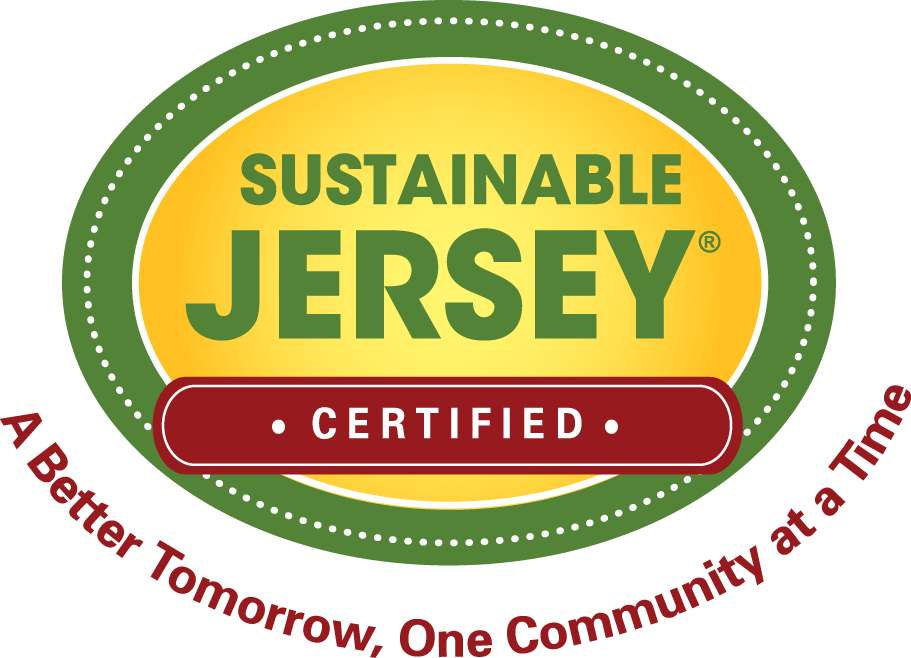Sustainability in Action
In the Winter 2025 issue of the Sustainable Jersey Newsletter:
- Red Bank Borough: A Leader in Complete and Green Streets for All (Monmouth County)
- From Garbage to Garden: Paramus High School Transforms Cafeteria Scraps (Bergen County)
- Sustainable States Network: Shared Vision. Local Impact.
- A Decade of Impact: Roxbury Public Schools Use Grants to Grow Aeroponic Gardens and Support Certification (Morris County)
- New Resource Helps Municipalities and Schools Make Smart, Sustainable Purchasing Decisions
Red Bank Borough: A Leader in Complete and Green Streets for All (Monmouth County)

Red Bank Borough continues to set the standard for creating safe, accessible and sustainable streets for all users. Since adopting its initial Complete Streets Policy in 2010 and updating it in 2018, Red Bank has made significant strides toward ensuring that roadways accommodate the needs of drivers, pedestrians, bicyclists, transit riders, emergency responders and goods movement based on local conditions and context.
A well-crafted Complete Streets policy defines its purpose, sets clear goals and outlines the methods by which these goals will be achieved. Red Bank’s policy goes a step further by embedding Complete Streets principles into routine road maintenance, planning and design. A key component of this effort is the borough’s Complete Streets Concept Development Checklist, which is used by borough engineers and municipal planning and zoning boards. This checklist ensures that all development applications and road projects consider the needs of drivers, pedestrians, cyclists and transit users while incorporating green stormwater infrastructure.
However, perhaps the most significant milestone was achieved on July 25, 2024, when Red Bank Borough formalized a Complete Streets Advisory Committee and officially adopted a Complete and Green Streets Ordinance. This ordinance establishes permanent and enforceable policies to ensure that Complete Streets principles are an integral part of the borough’s culture and operations.
Councilwoman Nancy Blackwood, a strong advocate for these initiatives, emphasized the importance of adding these practices into Red Bank’s everyday governance. "Implementation must be embedded in the plans, procedures and regulations that shape our local actions. We are committed to making our streets truly accessible for all, prioritizing pedestrians, cyclists and motorists—in that order. A town like Red Bank, with a walkability rating exceeding 90%, should already have streets that are safe for everyone. The time for action is not just now—it’s long overdue. With the help of the Complete Streets Advisory Committee, we are actively working to bring these necessary changes to life." Blackwood’s journey, from Red Bank Green Team member in 2019 to her current role on the council, exemplifies the impact of community advocacy in driving policy change.
Beyond local benefits, Red Bank’s commitment to Complete Streets also enhances its ability to secure crucial funding. The New Jersey Department of Transportation (NJDOT) prioritizes municipalities with established Complete Streets policies when awarding federal and state grant funding. Additionally, Red Bank Borough earned 30 Sustainable Jersey certification points by completing the: Complete & Green Streets for All Policy Action.
Red Bank was a recipient of the North Jersey Transportation Planning Authority’s (NJTPA) competitive grant program, which provided $10,000 in technical assistance to support the Borough’s efforts to advance Complete Streets. NJTPA partners with Sustainable Jersey and the Voorhees Transportation Center at Rutgers University to provide the technical assistance program. Red Bank is implementing the recommendations provided in their 2019 Pedestrian Safety Demonstration Project Report.
From Garbage to Garden: Paramus High School Transforms Cafeteria Scraps (Bergen County)
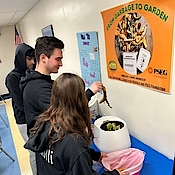
Have you ever wondered if the food scraps tossed in the trash at your school cafeteria could be put to better use? At Paramus High School, a group of students and teacher set out to find a solution and spark a change. With support from a Sustainable Jersey grant funded by the PSEG Foundation, the school launched a pilot program to track food waste, test composting methods and gauge the enthusiasm of students, teachers and staff to compost. The results? An impressive shift in the school’s waste management, proving that sustainability starts with small, meaningful actions.
In 2022, the Helping Our Planet Earth (HOPE) club and Advanced Placement environmental science students completed a waste audit that revealed over 46% of garbage was compostable food waste. The school applied and received a 2023 Sustainable Jersey grant to purchase two Lomi tabletop composters and three rotating composters. Students and staff measured the volume of food scraps produced, finding that the cafeteria produces approximately 12 pounds of food scraps daily. The new composters successfully compost 11.8 pounds weekly. To address the food scraps that are still ending up in the garbage, the students are working on new solutions, such as expanding composting efforts and collaborating with farms to repurpose the waste. Also, two raised garden beds were constructed, and students in the special needs classes (LEAP Program) planted seeds using compost to cultivate a vegetable garden.
Overall, the initiative involved approximately 250 students and 200 teachers and kitchen staff. Beyond reducing waste, the project has provided hands-on lessons in sustainability and environmental responsibility. Students have also shared their knowledge with the community through various presentations on composting and the impact of the garden. For example, they collaborated with the Paramus Environmental Commission and participated in the town-wide Earth Day Fair. At the event, they hosted an interactive booth featuring one of the school’s composters and a rotating compost bin, demonstrating how food waste can be transformed into compost. They also engaged younger children in composting-themed games and activities.
Maggie Touloughian, the Paramus High School science teacher who led the pilot project, emphasized the initiative’s broader impact: “This project demonstrates that with creativity and teamwork, waste can be turned into a valuable resource. The students and staff didn’t just transform garbage into a garden—they helped cultivate a culture of sustainability within our school community.”
Schools can get Sustainable Jersey certification points by completing the action: Food Waste Recycling or Composting. In addition, the Sustainable Jersey Toolkit for PreK-12 Schools (Reduce, Recover & Recycle Food Waste) highlights the Sustainable Jersey for Schools actions that correspond to food waste reduction practices.
Sustainable States Network: Shared Vision. Local Impact.
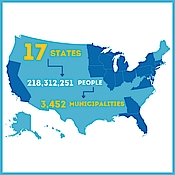
In March 2025, 40 attendees gathered in Maryland for the Sustainable States Network annual meeting, harnessing the power of collaboration in advancing sustainability efforts. Network members represent 17 states located across both coasts as well as the center of the nation. These state-level programs support local governments as change agents for progress on sustainability, resiliency and climate readiness. The results impact more than 218 million people in communities across the United States.
In addition to Sustainable Jersey, the state programs participating in the Sustainable States Network include Florida Green Local Government Standard, Sustainable CT, Sustainable Maryland, Michigan Green Communities, Minnesota GreenStep Cities and Sustainable Pennsylvania, among others. These programs work to equip local governments with the tools and knowledge needed to implement sustainable practices effectively.
Sustainable Jersey was a founding partner that helped to organize the national network. Reflecting on the network’s growth and impact, Sustainable Jersey Senior Researcher, Dr. Melanie McDermott, said, “We’re proud of what our programs have accomplished this year and understand that local action matters more now than ever. Network members engage over 3,452 municipalities and counties. These numbers have grown each year since the Network’s founding in 2015, as more local governments seek support to become sustainable, climate ready and more equitable.”
Sustainable States Network envisions a future where sustainability becomes the norm, and local governments play a pivotal role in addressing climate challenges. The last year demonstrated the urgency of these efforts, with communities nationwide facing extreme weather events, including flooding, droughts, heatwaves and wildfires. However, many local governments, both large and small, continue to struggle with limited resources, staffing and expertise needed to navigate the rapidly evolving climate landscape.
The Sustainable States Network programs provide essential support to municipalities through certification, recognition and technical assistance. By defining best practices and offering structured guidance, the Network ensures that communities—regardless of their starting point—can make measurable progress toward sustainability. With local action at the forefront, the Sustainable States Network continues to drive meaningful change, helping municipalities build resilience and thrive in a more sustainable future.
A Decade of Impact: Roxbury Public Schools Use Grants to Grow Aeroponic Gardens and Support Certification (Morris County)
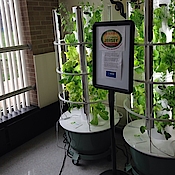
Never underestimate the power of a grant to inspire enthusiasm and action for sustainability programs. For a decade, the Sustainable Jersey Grants Program has served as a vital source of funding for sustainability initiatives in New Jersey schools and districts. With over $3.5 million in grants distributed, 56% of participating school districts have received at least one grant to support their sustainability efforts.
The Roxbury Township School District is a prime example of how these grants can drive meaningful change. Since 2016, the district secured 13 grants totaling $36,000 from the Sustainable Jersey Grants Program. All seven schools achieved bronze-level Sustainable Jersey for Schools certification in 2018 and have continuously built upon their sustainability efforts, achieving silver-level certification in 2024.
One of the projects supported by these grants is the district’s hydroponic gardening program. All seven Roxbury schools now feature aeroponic gardens inside their buildings, thanks to Sustainable Jersey grants funded by the New Jersey Education Association and PSEG Foundation. The aeroponic garden towers allow students to grow and harvest fresh vegetables and herbs while learning about sustainability and modern agricultural techniques. At Franklin Elementary School, students cultivate a variety of greens, including basil, kale, rainbow chard and bib lettuce. The produce is shared with students, staff, families and the broader community, all while using only 10% of the land and water required by traditional gardens.
At Jefferson Elementary School, students engage in hands-on learning by nurturing crops from tiny green pods to fully grown vegetables in two aeroponic garden towers. Guided by their teachers, students harvest lettuce, basil, green beans and tomatoes, sharing their bounty with the school community. Fifth and sixth graders gain firsthand experience in sustainability through hydroponic growing activities and by observing plant life cycles.
Eisenhower Middle School also embraced this sustainability initiative, integrating aeroponic garden towers into its cafeteria operations. These gardens provide fresh produce for students at lunchtime while doubling as interactive educational tools. Students participate in garden maintenance, including watering the plants during lunch breaks, which creates a sense of ownership and reinforces lessons in plant biology and environmental science. Four schools in the Roxbury Township School District earned 20 points toward certification, and three schools received 10 points, by completing the Sustainable Jersey for Schools action: School Gardens. The Roxbury schools have also used Sustainable Jersey grants to support a sustainable entrepreneurs’ program in five of the schools, a waste reduction education program, sustainability expos, outdoor classrooms and more.
This year marks the 10th anniversary of Sustainable Jersey for Schools advancing sustainability in New Jersey’s public schools. From integrating sustainability into classroom education and improving district-wide energy efficiency, to implementing innovative food waste reduction strategies, participating schools and districts have been leading the way in fostering a greener future.
New Resource Helps Municipalities and Schools Make Smart, Sustainable Purchasing Decisions
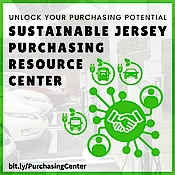
Transitioning to a green fleet by investing in alternative fuel vehicles and electric vehicle charging infrastructure is a powerful way for school districts and municipalities to save money while reducing their environmental footprint. However, navigating the complexities of green purchasing—understanding various options, identifying reliable suppliers, and managing cooperative purchasing agreements—can be daunting.
To simplify this process, the Sustainable Jersey Purchasing Resource Center was developed as a one-stop resource for smarter, more sustainable purchasing decisions. This tool provides a directory of cooperative purchasing options from state, county and collaborative organizations. Additionally, it features a quote library showcasing eligible equipment and services tailored to meet specific needs. A key feature of the tool is that it helps users explore a range of alternative fuel vehicles and provides information on available electric vehicle (EV) chargers to support EV investments.
The creation of this resource was made possible through funding from the New Jersey Board of Public Utilities (NJBPU). By collaborating with manufacturers, dealerships, and cooperative purchasing organizations, the tool provides information on available green technologies. Through working meetings, webinars, and outreach efforts, the Purchasing Resource Center fosters a network of stakeholders committed to advancing sustainable mobility solutions.
For more information, visit https://bit.ly/PurchasingCenter and watch the webinar recording of the informational session, Unveiling the Sustainable Jersey Purchasing Resource Center for Schools and Municipalities. This session includes a presentation on EV & EV charging equipment incentives by Cathleen Lewis, NJBPU’s Clean Transportation Programs Manager.
